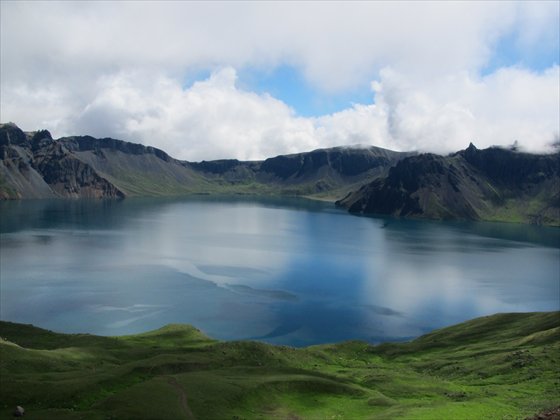The Changbai climb

Mist from Tianchi (Heavenly Lake) rises, creating a magnificent setting at Changbai Mountain. Photo: Er Dong

This week's destination
I was nearly out of breath. My lungs were gasping for air and my shirt was completely soaked through the back.
Yet somehow I managed to carry on, begrudgingly, one foot in front of the other, until alas - after an excruciatingly exhausting 1,442 steps, which has since made me realize the need for routine exercise - I had reached the top of Changbai Mountain from Northeast China's Jilin Province. And it was then, at that very moment, that I became truly breathless.
Taken by the stunning larger-than-life scene below, with my very own eyes, I saw the legendary Tianchi, or Heavenly Lake.
Though I had been long expecting to see a beautiful sight, I still could not believe my eyes. Under the bright sunshine, with the morning breeze, the lake appeared placid, with the water bluish here and greenish there, depending on where my gaze went.
On the other side of the lake, the hills and slopes, covered with green grass and colorful flowers, varied in bright streaks and earthy tones, almost as if whimsically painted into the backdrop. The reflection of angelically white, puffy clouds on the water turned the water a silver-grey, drawing a romantic mist from the surface of the water as it reached directly into low-hanging clouds, enshrouding the lake into great mystery.
Despite being among hundreds, if not thousands, of enthusiastic tourists, mostly visitors from other parts of China and quite a few from South Korea, shouting loudly to one another, busily taking photos and having their photos taken, I somehow managed to block out the noise and crowds. And with the heavenly view in front of me, I enjoyed a moment of solitude.
Tianchi, literally meaning Heavenly Lake, is a crater lake that lies within a caldera atop the volcanic Changbai Mountain. At 2,744 meters, it is the tallest peak within the Changbai Mountain Range.
With a circumference of 12 to 14 kilometers and an average depth of 213 meters, and the deepest point at 384 meters, according to a promotional tourist pamphlet, the lake is dubbed "the deepest lake in China" and appeared as one big wonder. Exceeding heights of 2,500 meters, the points dotted the caldera rim surrounding the lake as if protecting the beautifully serene area.
Straddling the border
From the Chinese side, there are two routes leading to the top of Changbai Mountain and Tianchi. One is from the northern slope, and the other is from the western slope.
On the western slope, just dozens of meters from the lake stands an imposing stone boundary marker demarcating China and North Korea. Visitors are allowed to cross into a small, cordoned-off area to take pictures of the territorial division from the Korean side. The hot "Here I am" marker serves as a must-have photo backdrop.
Crowding the site, Chinese visitors eagerly pile up, pushing this way and that to have their photo taken by the sides of the marker, while South Korean tourists appear just as excited, for which of course, they have their own reasons.
Derived from its snow-capped mountains, the name of the mountain, Changbai in Chinese, literally means "ever white." Perhaps the best known in China of the mountains within the Changbai Mountain Range that extends from northeastern Chinese provinces Heilongjiang, Jilin and Liaoning into North Korean provinces Ryanggang and Chagang, Changbai Mountain is also the source of the Songhua, Tumen and Yalu rivers.
On our way from Changchun, the capital of Jilin, to Erdaobaihe, the closest town to Changbai Mountain, roughly 500 kilometers away, our energetic tour guide, Zhang Ye, did her best to prepare us, wanting us to be capable of managing our expectations once we arrived.
She told us that we would be sharing the mountain with countless of other tour groups. Many visitors had also joined a two-day tour, in groups of about 50 people. And as such, we shouldn't expect to see too much of Tianchi, she said.
Weather-wise, Zhang said that even though we were traveling there during the best time of year, from August to October (before the lake starts to freeze over by mid-October through to mid-June), a sudden spell of rain or mist could make the lake invisible. Zhang said that she knew a tourist who visited four times, but pitifully, had failed to see the lake on each trip.
We were lucky enough to see it in bright sunshine. It couldn't have worked out more perfectly, nor just as well. My aging body doesn't have enough left in it for another three treks, never mind ones to end in disappointment.
Among the throngs of tourists, some also came expecting to see other out-of-this-world things, buying into the belief that Loch Ness Monster-types live below in Tianchi. In the most recent supposed sighting of the legendary creatures in August 2003, about 40 visitors said that they witnessed seal-like, finned "monsters' swimming in the water.
I saw nothing of the sort to back up the claim there, however. In the camp of non-believers, the only thing that I do believe is that the stories are just that - fictitious tales to promote local tourism.
Unforgettable sights
Even if one fails to see the lake due to unfriendly weather, a trip to Changbai Mountain itself is sure to be an unforgettable journey, and one that will be undoubtedly worth the while.
No visitor can easily shake or forget the magnitude of the impressive scenery at the top of the mountain. It is a majestic sight and a powerful feeling that is better left to experience rather than even the most descriptive of words or compelling of photographs.
At 125 yuan ($20) to enter the area, Changbai Mountain Nature Reserve Park, the fee is reasonable for what you get. Another 85 yuan will get you a seat on a shuttle bus that takes a 40-minute zigzag route to a parking lot at the base of the mountain, where it all begins. If any consolation is to be offered, the daunting stair way-climb, padded with wooden planks, is at least comparatively easier than managing up other famous mountains in China, such as Huangshan, or Yellow Mountain, in Central China's Anhui Province.
The scenery along the zigzagging road to the foot of the mountain also offers a rare chance to see myriad plants and animals. The ascending western slope has remained almost unaltered by humans over the years, but the warming climate over the past several decades is starting to shift the landscape, according to historical records in the nearby Changbai Mountain Museum, also worthy of a peek.
A thicker forest canopy is seen in the upper reaches and in the upper slopes fewer birch trees survive while more pine trees appear. Still, an abundance of plant life exists here, with varying species found in the area.
At the foot of the mountain, and up to 1,000 metres above sea level, lies a mixture of broadleaf trees and coniferous trees, standing tall and straight, with impressive economic value. And at nearly 2,000 metres above sea level, Erman's birch tree, a species indigenous to Changbai Mountain, are everywhere. Beyond that grow lichens of various kinds.
The area is additionally a known habitat for many wild birds such as black grouse, owls, and woodpeckers. Tigers, bears, leopards, wolves, and wild boars also inhabit the area. We weren't fortunate enough to see any of the large animals, but squirrels are everywhere, hopping among the rotten boughs on the ground, peering over their shoulders at visitors with their tiny, adorable round eyes.
If you still have some energy left after your journey up Changbai Mountain, be sure to check out a section of the 70-kilometer long Jinjiang Grand Canyon, another must-see scenic spot in the area.
The deep canyon came into being after a remote volcanic eruption occurred. The banks of the canyon are very steep, covered with luxuriant trees and more lichens. Formation of rocks in the canyon looks like works of God. Very popular among tourists, the site is a refreshing retreat with stunning waterfalls and plenty of fresh air.
An escape from the hustle and bustle of urban life, it is a nice, cool place to relax at, especially during summer, when much of the country is scorching hot and uncomfortably humid.
Rules of Thumb
How to go:
Start at either Changchun, or Yanji, an autonomous Korean prefecture, also in Jilin Province. From both of these cities, you can reach Changbai Mountain by train or long-distance bus. Independent tourists are welcome, if you prefer to travel on your own without a tour group.
Where to stay:
While there is choice, hotel options here are not limitless. Expect simple conditions and an untidy room without the quantity or quality of modern amenities that you would expect to enjoy at a big city hotel. If you travel with a tour group that makes your arrangements, be prepared to share a room with four or five strangers - and for a sleepless night. Upgrade your hotel room with your tour guide by adding around 100 yuan to reduce your disappointment.
When to go:
Be sure to bring warm clothes and waterproof outerwear. The weather on the mountain can be very erratic.